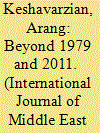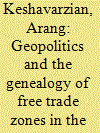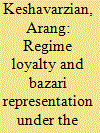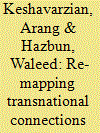| Srl | Item |
| 1 |
ID:
112181


|
|
|
|
|
| Publication |
2012.
|
| Summary/Abstract |
In the midst of several research trips to Iran in the 1990s, I spent one year living and conducting exploratory research in Cairo. In Tehran, revolution seemed unfinished if not perpetual, yet in Egypt it was unimaginable. In spite of the entrenched support for the Leader and the political status quo, at this time Iran's reformist movement was robust. The policies of the Islamic Republic and consequences of the eight-year war with Iraq unleashed new social conditions that combined with established forces to push for women's rights, freedom of speech, independent civil associations, and exposing contradictions in the postrevolutionary order.
|
|
|
|
|
|
|
|
|
|
|
|
|
|
|
|
| 2 |
ID:
096868


|
|
|
|
|
| Publication |
2010.
|
| Summary/Abstract |
Free trade zones have been championed by policy makers as important mechanisms for the "economic liberalisation" and "globalisation" of the Middle East. While a growing number of political economists have begun to investigate the performance of these projects, few have considered why states voluntarily limit their sovereign powers by establishing these liberalised territories. To address this question, this paper studies the Jebel Ali free trade zone in Dubai (UAE) and the Kish free trade zone in Iran, two of the earliest such projects in the region. Rather than being products of neoliberal ideology or pressure from advanced industrial economies, the essay argues that paradoxically these zones were developed by the Iranian state and Dubai emirate to project territorial sovereignty in turbulent geostrategic settings and moments as well as nodes to circulate rent to domestic and international members of ruling coalitions. The geostrategic and state-building logics informed when, where, and how these projects were developed. More generally, this analysis illustrates that the Middle East is neither absent from the process of globalisation, nor does it simply respond passively and reactively to this complex process. Free trade zones are an example of local strategies working in consort with international processes to fashion new forms of economic and political interconnectedness.
|
|
|
|
|
|
|
|
|
|
|
|
|
|
|
|
| 3 |
ID:
090388


|
|
|
|
|
| Publication |
2009.
|
| Summary/Abstract |
The prevailing perception within the academy, policy circles, and the media inside and outside Iran has been that the members of bazaars are a unified social class engaged in a symbiotic relationship with the political elite of the Islamic republic and the conservative faction in particular. This approach is largely built on the perspective that there is a historic predilection for b?z?r?s and clerics to cooperate ("mosque-bazaar alliance"), and thus ideological compatibility and familial ties between the clergy and b?z?r?s have continued and developed into an alliance under the current regime headed by segments of the clergy. For instance, one of the leading experts on 20th-century Iran, Nikki Keddie, comments that, despite Mohammad Khatami's reformist agenda, "the ruling elite, who represent an alliance between the commercial bazaar bourgeoisie and conservative clerics, resist giving up their economic privileges as they do their political ones."
|
|
|
|
|
|
|
|
|
|
|
|
|
|
|
|
| 4 |
ID:
096865


|
|
|